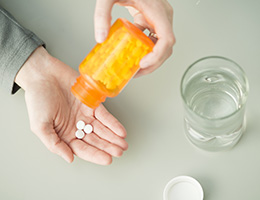
If you take prescription medicines, then you know they can help you feel better and protect your health. But medicines can also cause serious harm if you or someone else misuses them.
What is misuse?
Generally speaking, people misuse their medicines when they take them in a manner other than directed. For instance, they may take too much of a medicine, take it when they don't need it or take it with alcohol or other drugs, according to the American Academy of Family Physicians. Misuse can also happen when someone takes another person's prescription, perhaps to ease their pain or to get high.
When taken as directed, medicines are generally safe and effective. But if misused—unintentionally or on purpose—they can be just as deadly as street drugs. They may not work as intended. Worse, misusing them may increase the risks for serious side effects, addiction or even a fatal overdose.
Who's at risk for misuse?
Although anyone can misuse prescription drugs, some groups are at increased risk, according to the National Institute on Drug Abuse (NIDA). They include:
Younger people. It happens more frequently than you might realize. Surveys show that teens and young adults who misuse prescription drugs often get them from a friend or relative.
Older adults. Because older adults typically have multiple medical problems, they often take more medicines. Many seniors take at least five prescriptions on a daily basis, the NIDA reports. This raises the risk of mistakes and misuse.
Any medicine can be misused. But it's particularly a problem with prescription opioid painkillers and medicines used to treat anxiety, sleep problems or attention-deficit hyperactivity disorder, according to the NIDA.
Minimize the risk of misuse
To reduce the chances of prescription drug misuse:
Take as directed. Always take your medicine exactly as stated on the drug label or as your doctor or pharmacist recommends. For example, never take more or less of a medicine unless directed by your doctor. If you're not sure how to take your medicine, tell your doctor or your pharmacist. Never guess.
Learn what to avoid. Find out from your doctor or pharmacist if it's safe to take your prescription with other medicines, including over-the-counter products, alcohol or other substances. For example, combining an opioid with alcohol or an opioid with an anxiety or sleep medication can cause a life-threatening reaction. Even combining opioids with an over-the-counter cold medication can be a problem.
Report problems. Ask your doctor what symptoms you should report that could signal a bad drug interaction or a problem with drug dependence.
Don't share your medicines. And never take anyone else's medicines, even if you think they might help you.
Store your meds safely. Keep your medicines in a safe, secure place, such as a locked cabinet or a location where it's difficult for other people to get to them.
Dispose of old meds ASAP. Safely get rid of unneeded medicines so that they're less likely to wind up in the wrong hands by accident or intention. One option might be a drug take-back program. Your pharmacist might know of one. If your medicine came with disposal instructions, follow that advice. For instance, some medicines can be safely flushed down the toilet.
Help is available
Do you need help finding treatment for a substance abuse problem? Talk to your doctor. Or call the Substance Abuse and Mental Health Services Administration's free and confidential national helpline at 800.662.4357.
Reviewed 3/6/2025